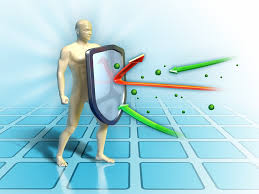 Our immune system is a complex organization of cells and organs that operate to defend against invaders. At least, that is the current understanding of how the immune system works. However, because of the complexity of both the system, and the components within the system, it may be that it also has other functions that have not yet been identified.
Our immune system is a complex organization of cells and organs that operate to defend against invaders. At least, that is the current understanding of how the immune system works. However, because of the complexity of both the system, and the components within the system, it may be that it also has other functions that have not yet been identified.
At this point doctors believe that the immune system protects the body from infections and illnesses. It works to identify pathogens from other cells, such as tumors, that can cause diseases and then to eliminate them from the body. It accomplishes this using several different types of cells and integrating many of the vitamins and trace minerals required for biological and biochemical processes. (1)
The job of the immune system is very difficult because pathogens and cells can adapt themselves or redesign themselves, trying to sneak in under the radar, so to speak. However, the immune system is also complex with specific cells that have specialized functions.
Human beings also have the added protection of a system that can also adapt. After exposure to a specific pathogen it updates the response technology within the body that helps antibodies to recognize a pathogen and respond more quickly the next time the body is attacked. This learning curve helps the body to respond better and quicker and is called an immunological memory. This memory can be significantly impacted in a negative fashion when an individual does not get the normal number of common colds or illnesses because they are overly protected or receive an extraordinary number of vaccines.
When the immune system is not challenged it is not able to fight infections as well when they do occur. There is on-going research to determine if a reduced ability to recognize viral and bacterial infections can also increase the risk that the immune system will perceive itself, its own body, as a pathogen and thus result in an immune mediated disease, such as lupus.
There are four different specific organs in the body which interrelate and function with the immune system. The first is the bone marrow, found in the center of the larger long bones. All the cells of the immune system initially come from the bone marrow and then differentiate, or change, into mature cells or precursors that then work in the body. (2)
 The thymus is a gland located in the chest which produces mature T cells. The immature precursors leave the bone marrow and migrate to the thymus. These T cells are beneficial to the immune system and are released into the bloodstream by the thymus gland. (3)
The thymus is a gland located in the chest which produces mature T cells. The immature precursors leave the bone marrow and migrate to the thymus. These T cells are beneficial to the immune system and are released into the bloodstream by the thymus gland. (3)
The spleen is a large organ found in the abdominal cavity whose job it is to filter the blood. The spleen is made up of B cells and T cells as well as macro phages and dendritic cells. The spleen functions to capture foreign material and then initiates an immune response. In addition, the spleen also destroys old red blood cells in order to make room for new ones that are constantly being manufactured. (4)
The last system is the lymph nodes which also function as an immunological filter. These nodes are located around the body and are composed mostly of T cells, B cells and dendritic cells. It works much the same as the spleen only filtering lymph material and not blood.
The food that we eat, the vitamins and minerals we ingest, our environment, as well as the amount of sleep we receive all interact in the overall health and well-being of the immune system. For instance, those of us who keep an excessive amount of sugar in the diet will find they suffer from an increased risk of infection and allergies because the sugar hampers the immune system’s ability to function appropriately. Researchers are able to identify decreased activity in number of white blood cells in the immune system in people who consume sugar.
The immune system of the human body is a very complex process that utilizes many factors in order to achieve a successful result. Viruses and bacteria will continue to mutate and so the immune system must remain vigilant. The only way in which this vigilance and protection can happen in an optimal fashion is when the body is fed an appropriate amount of vitamins and minerals.
References:
(1) Kidshealth.org: Immune System
http://kidshealth.org/parent/general/body_basics/immune.html
(2)Mount Sinai School of Medicine: Bone Marrow Plays Critical Role in Enhancing Immune Response to Viruses, Researchers Find
http://www.sciencedaily.com/releases/2010/05/100524143423.htm
(3) Gladstone Institute of Virology and Immunology: Immune System Reactivated In Adults With HIV: Thymus Producing New T-Cells
http://www.sciencedaily.com/releases/2008/02/080221183340.htm
(4) National Institute of Allergy and Infectious Diseases: The Structure of the Immune System
http://www.niaid.nih.gov/topics/immunesystem/Pages/structure.aspx


Leave a Reply